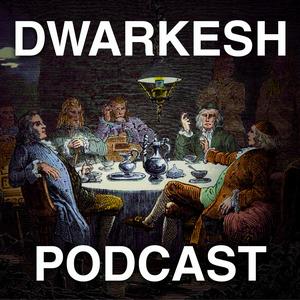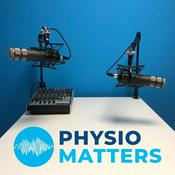115 odcinków
- Adam Marblestone is CEO of Convergent Research. He’s had a very interesting past life: he was a research scientist at Google Deepmind on their neuroscience team and has worked on everything from brain-computer interfaces to quantum computing to nanotech and even formal mathematics.
In this episode, we discuss how the brain learns so much from so little, what the AI field can learn from neuroscience, and the answer to Ilya’s question: how does the genome encode abstract reward functions? Turns out, they’re all the same question.
Watch on YouTube; read the transcript.
Sponsors
* Gemini 3 Pro recently helped me run an experiment to test multi-agent scaling: basically, if you have a fixed budget of compute, what is the optimal way to split it up across agents? Gemini was my colleague throughout the process — honestly, I couldn’t have investigated this question without it. Try Gemini 3 Pro today gemini.google.com
* Labelbox helps you train agents to do economically-valuable, real-world tasks. Labelbox’s network of subject-matter experts ensures you get hyper-realistic RL environments, and their custom tooling lets you generate the highest-quality training data possible from those environments. Learn more at labelbox.com/dwarkesh
To sponsor a future episode, visit dwarkesh.com/advertise.
Timestamps
(00:00:00) – The brain’s secret sauce is the reward functions, not the architecture
(00:22:20) – Amortized inference and what the genome actually stores
(00:42:42) – Model-based vs model-free RL in the brain
(00:50:31) – Is biological hardware a limitation or an advantage?
(01:03:59) – Why a map of the human brain is important
(01:23:28) – What value will automating math have?
(01:38:18) – Architecture of the brain
Further reading
Intro to Brain-Like-AGI Safety - Steven Byrnes’s theory of the learning vs steering subsystem; referenced throughout the episode.
A Brief History of Intelligence - Great book by Max Bennett on connections between neuroscience and AI
Adam’s blog, and Convergent Research’s blog on essential technologies.
A Tutorial on Energy-Based Learning by Yann LeCun
What Does It Mean to Understand a Neural Network? - Kording & Lillicrap
E11 Bio and their brain connectomics approach
Sam Gershman on what dopamine is doing in the brain
Gwern’s proposal on training models on the brain’s hidden states
Get full access to Dwarkesh Podcast at www.dwarkesh.com/subscribe - Read the essay here.
Timestamps
00:00:00 What are we scaling?
00:03:11 The value of human labor
00:05:04 Economic diffusion lag is cope00:06:34 Goal-post shifting is justified
00:08:23 RL scaling
00:09:18 Broadly deployed intelligence explosion
Get full access to Dwarkesh Podcast at www.dwarkesh.com/subscribe - This is the final episode of the Sarah Paine lecture series, and it’s probably my favorite one. Sarah gives a “tour of the arguments” on what ultimately led to the Soviet Union’s collapse, diving into the role of the US, the Sino-Soviet border conflict, the oil bust, ethnic rebellions and even the Roman Catholic Church. As she points out, this is all particularly interesting as we find ourselves potentially at the beginning of another Cold War.
As we wrap up this lecture series, I want to take a moment to thank Sarah for doing this with me. It has been such a pleasure.
If you want more of her scholarship, I highly recommend checking out the books she’s written. You can find them here.
Watch on YouTube; read the transcript.
Sponsors
* Labelbox can get you the training data you need, no matter the domain. Their Alignerr network includes the STEM PhDs and coding experts you’d expect, but it also has experienced cinematographers and talented voice actors to help train frontier video and audio models. Learn more at labelbox.com/dwarkesh.
* Sardine doesn’t just assess customer risk for banking & retail. Their AI risk management platform is also extremely good at detecting fraudulent job applications, which I’ve found useful for my own hiring process. If you need help with hiring risk—or any other type of fraud prevention—go to sardine.ai/dwarkesh.
* Gemini’s Nano Banana Pro helped us make many of the visuals in this episode. For example, we used it to turn dense tables into clear charts so that’d it be easier to quickly understand the trends that Sarah discusses. You can try Nano Banana Pro now in the Gemini app. Go to gemini.google.com.
Timestamps
(00:00:00) – Did Reagan single-handedly win the Cold War?
(00:15:53) – Eastern Bloc uprisings & oil crisis
(00:30:37) – Gorbachev’s mistakes
(00:37:33) – German unification and NATO expansion
(00:48:31) – The Gulf War and the Cold War endgame
(00:56:10) – How central planning survived so long
(01:14:46) – Sarah’s life in the USSR in 1988
Get full access to Dwarkesh Podcast at www.dwarkesh.com/subscribe Ilya Sutskever – We're moving from the age of scaling to the age of research
25.11.2025 | 1 godz. 36 min.Ilya & I discuss SSI’s strategy, the problems with pre-training, how to improve the generalization of AI models, and how to ensure AGI goes well.
Watch on YouTube; read the transcript.
Sponsors
* Gemini 3 is the first model I’ve used that can find connections I haven’t anticipated. I recently wrote a blog post on RL’s information efficiency, and Gemini 3 helped me think it all through. It also generated the relevant charts and ran toy ML experiments for me with zero bugs. Try Gemini 3 today at gemini.google
* Labelbox helped me create a tool to transcribe our episodes! I’ve struggled with transcription in the past because I don’t just want verbatim transcripts, I want transcripts reworded to read like essays. Labelbox helped me generate the exact data I needed for this. If you want to learn how Labelbox can help you (or if you want to try out the transcriber tool yourself), go to labelbox.com/dwarkesh
* Sardine is an AI risk management platform that brings together thousands of device, behavior, and identity signals to help you assess a user’s risk of fraud & abuse. Sardine also offers a suite of agents to automate investigations so that as fraudsters use AI to scale their attacks, you can use AI to scale your defenses. Learn more at sardine.ai/dwarkesh
To sponsor a future episode, visit dwarkesh.com/advertise.
Timestamps
(00:00:00) – Explaining model jaggedness
(00:09:39) - Emotions and value functions
(00:18:49) – What are we scaling?
(00:25:13) – Why humans generalize better than models
(00:35:45) – SSI’s plan to straight-shot superintelligence
(00:46:47) – SSI’s model will learn from deployment
(00:55:07) – How to think about powerful AGIs
(01:18:13) – “We are squarely an age of research company”
(01:20:23) – Self-play and multi-agent
(01:32:42) – Research taste
Get full access to Dwarkesh Podcast at www.dwarkesh.com/subscribe- As part of this interview, Satya Nadella gave Dylan Patel (founder of SemiAnalysis) and me an exclusive first-look at their brand-new Fairwater 2 datacenter.
Microsoft is building multiple Fairwaters, each of which has hundreds of thousands of GB200s & GB300s. Between all these interconnected buildings, they’ll have over 2 GW of total capacity. Just to give a frame of reference, even a single one of these Fairwater buildings is more powerful than any other AI datacenter that currently exists.
Satya then answered a bunch of questions about how Microsoft is preparing for AGI across all layers of the stack.
Watch on YouTube; read the transcript.
Sponsors
* Labelbox produces high-quality data at massive scale, powering any capability you want your model to have. Whether you’re building a voice agent, a coding assistant, or a robotics model, Labelbox gets you the exact data you need, fast. Reach out at labelbox.com/dwarkesh
* CodeRabbit automatically reviews and summarizes PRs so you can understand changes and catch bugs in half the time. This is helpful whether you’re coding solo, collaborating with agents, or leading a full team. To learn how CodeRabbit integrates directly into your workflow, go to coderabbit.ai
To sponsor a future episode, visit dwarkesh.com/advertise.
Timestamps
(00:00:00) - Fairwater 2
(00:03:20) - Business models for AGI
(00:12:48) - Copilot
(00:20:02) - Whose margins will expand most?
(00:36:17) - MAI
(00:47:47) - The hyperscale business
(01:02:44) - In-house chip & OpenAI partnership
(01:09:35) - The CAPEX explosion
(01:15:07) - Will the world trust US companies to lead AI?
Get full access to Dwarkesh Podcast at www.dwarkesh.com/subscribe
Więcej Nauka podcastów
Trendy w podcaście Nauka
O Dwarkesh Podcast
Deeply researched interviews www.dwarkesh.com
Strona internetowa podcastuSłuchaj Dwarkesh Podcast, Sekcja teorii spiskowych. Podcast Crazy Nauka i wielu innych podcastów z całego świata dzięki aplikacji radio.pl

Uzyskaj bezpłatną aplikację radio.pl
- Stacje i podcasty do zakładek
- Strumieniuj przez Wi-Fi lub Bluetooth
- Obsługuje Carplay & Android Auto
- Jeszcze więcej funkcjonalności
Uzyskaj bezpłatną aplikację radio.pl
- Stacje i podcasty do zakładek
- Strumieniuj przez Wi-Fi lub Bluetooth
- Obsługuje Carplay & Android Auto
- Jeszcze więcej funkcjonalności


Dwarkesh Podcast
Zeskanuj kod,
pobierz aplikację,
zacznij słuchać.
pobierz aplikację,
zacznij słuchać.




































